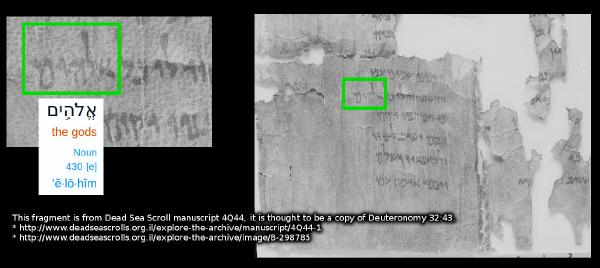Hebrews 1:6 – An Argument for the Critical Text

In the field of textual criticism, there are some who advocate a position called the Confessional Textual View. This view results in the assertion that the church should adopt the Bomberg Hebrew Bible and the Textus Receptus as it’s authoritative Hebrew and Greek texts respectively. These two are considered to be the biblical texts chosen by the Reformers. Together, these two texts are held up as the truly authentic, God-given texts of the Old and New Testaments.
But Hebrews 1:6 poses a serious problem for this “confessional” view, because it shows that there is a conflict between these two supposedly-authoritative texts.
The Textual Data
In the KJV, Hebrews 1:6 reads as follows:
And again, when he bringeth in the firstbegotten into the world, he saith, And let all the angels of God worship him .
Hebrews 1:6 (KJV)
This is a translation from the Greek of the Textus Receptus (coincidentally, Hebrews 1:6 is identical in the Textus Receptus and the NA27/UBS4).
οταν δε παλιν εισαγαγη τον πρωτοτοκον εις την οικουμενην λεγει και προσκυνησατωσαν αυτω παντες αγγελοι θεου
Hebrews 1:6 (Textus Receptus / UBS4)
There is general consensus that this verse is a quotation taken from Deuteronomy 32:43 in the Greek Septuagint (LXX), note the blue portion:
ευφρανθητε ουρανοι αμα αυτω και προσκυνησατωσαν αυτω παντες υιοι θεου ευφρανθητε εθνη μετα του λαου αυτου και ενισχυσατωσαν αυτω παντες αγγελοι θεου οτι το αιμα των υιων αυτου εκδικαται και εκδικησει και ανταποδωσει δικην τοις εχθροις και τοις μισουσιν ανταποδωσει και εκκαθαριει κυριος την γην του λαου αυτου
Deuteronomy 32:43 (LXX)
Astute readers will note that the verse in Deuteronomy has υιοι (sons) whereas the verse in Hebrews has αγγελοι (angels). However, “sons of God” was a known euphemism for angels in the Old Testament (c.f. Job 1:6), and apparently there are manuscripts of the LXX that have αγγελοι in this verse rather than υιοι. My guess as to the source of this variation is that each of the Greek variants represents a different viable translation of the same underlying Hebrew word אֱלֹהִ֣ים (elohim). While this Hebrew word is usually translated “gods”, it seems like it can potentially refer to angels in certain contexts (e.g. Psalm 8:5). The trouble is that this word אֱלֹהִ֣ים (gods) does not appear at all in most Hebrew or English versions of Deuteronomy 32:43. For example:
Rejoice, O ye nations, with his people: for he will avenge the blood of his servants, and will render vengeance to his adversaries, and will be merciful unto his land, and to his people.
Deuteronomy 32:43 (KJV)
Rejoice, you nations, with his people, for he will avenge the blood of his servants; he will take vengeance on his enemies and make atonement for his land and people.
Deuteronomy 32:43 (NIV)
הַרְנִ֤ינוּ גוֹיִם֙ עַמּ֔וֹ כִּ֥י דַם־עֲבָדָ֖יו יִקּ֑וֹם וְנָקָם֙ יָשִׁ֣יב לְצָרָ֔יו וְכִפֶּ֥ר אַדְמָת֖וֹ עַמּֽוֹ׃ פ
Deuteronomy 32:43 (Hebrew Masoretic Text, both Bomberg and BHS)
However, the word gods does appear in a copy of Deuteronomy 32:43 found in one of the dead sea scrolls:

Sources:
- http://www.deadseascrolls.org.il/explore-the-archive/manuscript/4Q44-1
- http://www.deadseascrolls.org.il/explore-the-archive/image/B-298785
So, let’s recap the facts we’ve covered.
- The Textus Receptus and NA27/UBS4 agree that Hebrews 1:6 should contain a mention of “angels of God”.
- The context of Hebrews 1 makes it clear that this is a quote from the Old Testament.
- The quotation precisely matches the wording of Deuteronomy 32:43 in the Greek Septuagint (if we take the αγγελοι variant).
- The part of the Deuteronomy 32:43 being quoted exists in our oldest available Hebrew copy of Deuteronomy 32:43, but not in the vast majority of Hebrew copies.
- The part of Deuteronomy 32:43 being quoted does not appear in the Bomberg Hebrew Bible’s chosen variant of Deuteronomy 32:43, nor in any other edition of the Masoretic Text.
The Implications of the Data
What does this mean? It means that in this extremely rare case where we can see which variant reading an inspired biblical writer chose, they did not choose the variant that appears in the Bomberg Hebrew Bible, the majority-Hebrew available, both at the time of the Reformation and today. The implication of this is clear and unyielding. If the reading of Hebrews 1:6 in the Textus Receptus is correct, then the reading of Deuteronomy 32:43 in the Masoretic Text (including the Bomberg edition) is incorrect. Because the Textus Receptus and the Bomberg Hebrew disagree on the correct reading for this verse, they cannot both be authoritative texts for the church. At least one of them has a mistake which deserves correcting.
My simple solution is that the the variant chosen by the inspired author of Hebrews (1,500 years before Bomberg) is the correct one. The Masoretic text (including Bomberg’s edition) has undergone a mistake in transmission at some point, and deserves to be corrected so that it matches up with the testimony of the author of Hebrews. I am aware of only one English Bible that follows the Dead Sea Scrolls variant for this verse, that is the ESV:
“Rejoice with him, O heavens; bow down to him, all gods , for he avenges the blood of his children and takes vengeance on his adversaries.He repays those who hate himand cleanses his people’s land.”
Deuteronomy 32:43 (ESV)

But the implications don’t end there. The alleged “confessional” texts conflict with one another. They cannot both be correct, and this undermines the whole confessional view. However you slice it, it is necessary to consider readings from a variety of different manuscripts in order to most accurately reconstruct what was originally written by the biblical authors. If this sort of textual criticism is necessary to get Hebrews 1:6 right, then it is clearly not sinful in principle. A scary question for my friends who hold the confessional view: will you tell God that in the case of Deuteronomy 32:43, He has failed to properly preserve His word, simply because it has been preserved in manuscript readings other than those chosen by Bomberg and the Reformers? I wouldn’t want to accuse Him of that. I think the better solution is to admit that, in this particular case, the reconstructionist textual critics may have a point.
The olive branch is out. On behalf of the critical-text advocates, let me say that we like the TR, the Masoretic Text and the KJV, we really do! We consult them regularly when we are doing research. We just don’t think the evidence warrants believing that these historic texts are the final word on textual criticism.
Footnote One – Psalm 97:7
I am aware that some have argued for the quotation in Hebrews 1:6 to be understood as a reference to the Greek translation of Psalm 97:7, rather than Deuteronomy 32:43. Psalm 97:7 in Greek reads:
αισχυνθητωσαν παντες οι προσκυνουντες τοις γλυπτοις οι εγκαυχωμενοι εν τοις ειδωλοις αυτων προσκυνησατε αυτω παντες οι αγγελοι αυτου
The strength of this view is that the usual reading has αγγελοι rather than υιοι, although an explanation for this discrepancy was discussed in detail above. However, there are several differences between Hebrews 1:6 and Psalm 97:7 in Greek:
- The quotation in Hebrews 1:6 begins with και, but this word is missing from Psalm 97:7.
- In Hebrews 1:6 the verb to “worship” or “bow down” is a third-person imperative (“let them do X”), in Psalm 97:7 it is a second-person imperative (“you guys do X”).
- In Psalm 97:7, the nominative noun (αγγελοι/υιοι) has the definite article οι, in Hebrews 1:6 the article is absent.
- Psalm 97:7 uses the genitive third-person pronoun αυτου (“angels of him”), but Hebrews 1:6 uses the genitive noun θεου (“angels of God”).
On all four of these points, the grammar of the quotation in Hebrews 1:6 precisely matches Deuteronomy 32:43 in the LXX. Given this larger set of differences, I think we can safely conclude that while the phrasing of Psalm 97:7 is similar to Hebrews 1:6, the writer of Hebrews had Deuteronomy 32:43 in mind while writing the quotation.
Footnote 2 – Credit Where it is Due
I am indebted to the writer of this answer on stack exchange, which gave me a starting point for researching this post.